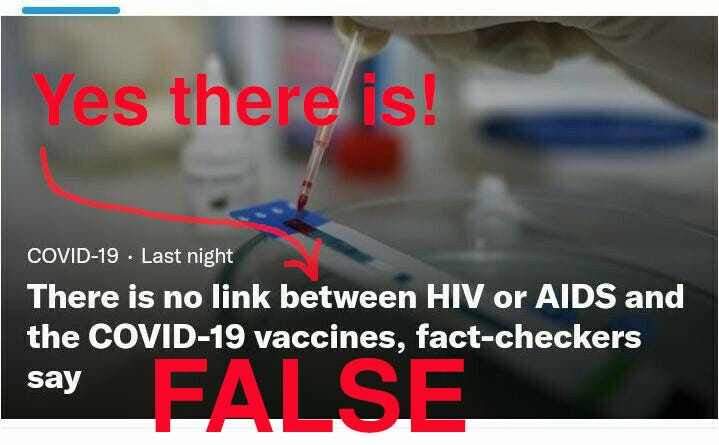Kirsch is out with his weekend missive to get you caught up on the alt media scene. Negative VE, farking great. 💰 🤦♀️

Kirsch is out with his weekend missive to get you caught up on the alt media scene. Negative VE, farking great. 💰 🤦♀️

They only used ivermectin, not ivermectin and zinc. It's like having a gun without the bullets.Womp womp @Boston.Knight
But, but, what about that Israel study that wasn’t a study? Or was it Japan?
Remember that @Crazyhole ? 😂

Ivermectin doesn't prevent severe disease from Covid-19, new study finds
The antiparasitic drug ivermectin doesn't prevent severe disease from Covid-19 any more effectively than symptom management and close observation by medical professionals, according to a study published Friday in the journal JAMA Internal Medicine.www.google.com
Fukcing zinc 😂😂😂😂They only used ivermectin, not ivermectin and zinc. It's like having a gun without the bullets.
But it doesn't matter anymore, because the only shred of the pandemic that's left is government overreach and sycophants that denied the idea that anything could treat this illness. There's literally nothing left other than to see whether mRNA vaccines have long term side effects.
There's literally nothing left other than to see whether mRNA vaccines have long term side effect

Fine. Ban the shit then if it's dangerous. I couldn't care less. Never should have been approved for anything if it kills people.Ivermectin futile for mild to moderate COVID-19, study finds
Filed Under:
COVID-19
Mary Van Beusekom | News Writer | CIDRAP News
|
Feb 18, 2022
Early treatment with the antiparasitic drug ivermectin does not lower the risk of severe disease when given to patients with mild to moderate COVID-19, according to a study today in JAMA Internal Medicine.
And a related study in the same journal finds connections between prescribing patterns for ivermectin and hydroxychloroquine by political-party vote share in 2020.
Lack of efficacy, more adverse events
Doctors at 20 Malaysian government hospitals and a COVID-19 quarantine center conducted an open-label, randomized clinical trial on the use of ivermectin in the first week of COVID-19 symptom onset in hospitalized adults 50 years and older with mild or moderate illness and underlying medical conditions. The study took place from May 31 to Oct 25, 2021.
Average patient age was 62.5 years, 54.5% were women, 51.8% had received two doses of a COVID-19 vaccine, 75.3% had high blood pressure, 53.5% had diabetes, 37.6% had abnormal cholesterol levels, and 23.9% were obese.
Patients were randomly assigned in a 1:1 ratio to receive oral ivermectin daily for 5 days plus standard care (241 patients) or standard care only (249). Standard care consisted of treatment of symptoms and monitoring of clinical findings, laboratory test results, and chest imaging for signs of disease progression.
Severe disease was defined as hypoxia (low oxygen levels) requiring the use of supplemental oxygen to maintain oxygen saturation at 95% or higher.
Fifty-two of 241 patients in the ivermectin group (21.6%) and 43 of 249 patients in the standard-care-only group (17.3%) became severely ill (relative risk [RR], 1.25; 95% confidence interval [CI], 0.87 to 1.80).
There were no significant differences between the two groups in time to symptom resolution or rates of mechanical ventilation, intensive care unit (ICU) admission, 28-day in-hospital death, or adverse events. Four ivermectin recipients (1.7%) required mechanical ventilation, compared with 10 (4.0%) in the standard-care group (RR, 0.41; 95% CI, 0.13 to 1.30).
Six patients (2.4%) in the ivermectin group were admitted to an ICU, versus 8 (3.2%) in the control group (RR, 0.78; 95% CI, 0.27 to 2.20), and 3 ivermectin recipients (1.2%) and 10 controls (4.0%) died by 28 days (RR, 0.31; 95% CI, 0.09 to 1.11).
Forty-four patients (9.0%) had 55 adverse events, 33 of them in the ivermectin group. The most common adverse event was diarrhea, occurring in 14 (5.8%) in the ivermectin group and 4 (1.6%) in the standard-care group.
Five serious adverse events—four in the ivermectin group—were reported. Two patients had a heart attack, one had severe anemia, and one went into shock owing to fluid loss from severe diarrhea, while one in the control group had arterial bleeding in the abdomen. Adverse events led six patients to stop taking ivermectin and three to withdraw from the study. Thirteen patients (2.7%) died, most from COVID-19 pneumonia; no deaths were attributed to ivermectin.
"The notably higher incidence of AEs [adverse events] in the ivermectin group raises concerns about the use of this drug outside of trial settings and without medical supervision," the researchers wrote.
The authors noted that ivermectin may appear to be an attractive alternative to expensive antiviral medications in resource-limited regions such as Malaysia because it is inexpensive, easy to use, and broadly available.
However, the World Health Organization recommends against its use outside of clinical trials, and it is not US Food and Drug Administration (FDA)-approved for the prevention or treatment of COVID-19. Indeed, the Centers for Disease Control and Prevention (CDC) confirmed with the American Association of Poison Control Centers that reports of ivermectin-related adverse events increased in 2021 relative to before the pandemic.
"The study findings do not support the use of ivermectin for patients with COVID-19," the authors concluded.
There is no educated opinion on the long term side effects of mRNA technology, only guesses.
Being an unemployed, uneducated handyman, I would not expect you to understand how mRNA vaccines work. Additionally, you don’t understand statistics. You and your fantasyland buddies are the only ones who think of it as “guesses.” Luckily for you, you never leave your houseThere is no educated opinion on the long term side effects of mRNA technology, only guesses.
It plain and simply doesn’t work. I knew this already, but waited. It was a longshot at best. It doesn’t possess enough antiviral effects (if any) to make a difference for this specific virus. Viruses are different. “Antiviral activity” is such a generic term. It was always going to be weak sauce. Sure, some study in the future may show differently, but in the end, it’s going to be a nothingburgerFine. Ban the shit then if it's dangerous. I couldn't care less. Never should have been approved for anything if it kills people.
Fine, it doesn't work. Ban the shit if it's killing people. Nobody really cares anymore.It plain and simply doesn’t work. I just blasted your buddy parade float in the Dungeon and he’s hiding like a little coward, because he can’t handle being wrong
There will always be your “quack” doctor who will give it no matter what. Hope they get reprimanded. That’s why they are quacks. Real physicians don’t give medications based on a hunch and Twitter feedsFine, it doesn't work. Ban the shit if it's killing people. Nobody really cares anymore.
Please keep us up to date as to what the walking Cinnabon has to say. I am sure he's just like crazy and all busted up:I just blasted your buddy parade float in the Dungeon and he’s hiding like a little coward, because he can’t handle being wrong
And ... get your patented mRNA Influenza Virus vaccine!
Sigh ... don't say I didn't warn everyone where this was headed.
Aaaaaaannnnnnnndddss bostwat completely ignores the horsepaste failure.
Crappy JAMA piece.Lol here we go again. That crappy JAMA hit piece was already torn to shreds
You were exposed for being an idiot by me and crazy twice now waving a different paper in our faces making false claims spoonfed to useful idiots like yourself . Consider yourself fortunate I even reply to this. I have no respect for you. But you guys are obsessed with me 😂
I could care less what you or any MSM covidiot think. My doctor treats thousands with ivermectin and a cocktail of stuff. No deaths, no hospital. Results talk son.
Huh? I explained why it was a poor study, just like the HCQ study that the VA did back in 2020. I really don't care, unlike you and Mike who desperately need there to not be an inexpensive treatment.LMAO at crazy getting upset because his precious horse paste whateverthefukc doesn't work in the exact same manner that his twitter heroes mindymuffdiver and tossmysaladsally said it would. You need a tissue, crybaby???

Hahahahahahahaha 😂😂😂You mean like a free fukcing vaccine????????
Bless your heart.
Poor study? Posted in JAMAHuh? I explained why it was a poor study, just like the HCQ study that the VA did back in 2020. I really don't care, unlike you and Mike who desperately need there to not be an inexpensive treatment.
Hahahahahahaha 😂😂😂😂😂😂😂😂😂😂😂😂😂😂😂😂😂😂😂😂😂😊That crappy JAMA hit piece was already torn to shreds
Their flu vaccine is a flop. The adverse events are on par with the covid vaccine.mRNA as a delivery platform for vaccines is dead. Nonetheless, I expect covidians everywhere to be lining up for anything mRNA right up to withdrawal of the tech
Their flu vaccine is a flop. The adverse events are on par with the covid vaccine.mRNA as a delivery platform for vaccines is dead. Nonetheless, I expect covidians everywhere to be lining up for anything mRNA right up to withdrawal of the tech

Interesting that you consider the vaccine to be a treatment.You mean like a free fukcing vaccine????????
Bless your heart.
More interesting that you don’t.Interesting that you consider the vaccine to be a treatment.
Whatever Twitter Tonisha says. That’s the new GOTO flavor of the week.Interesting that you consider the vaccine to be a treatment.
I was attacked on here for saying that these vaccines are more of a therapeutic than an inoculation. I'm just glad that you agree with that statement now, 9 months later.More interesting that you don’t.
Did I attack? And quite frankly, who cares.I was attacked on here for saying that these vaccines are more of a therapeutic than an inoculation. I'm just glad that you agree with that statement now, 9 months later.
Oh. So now you're all up in a twit about it. "Who cares?" sounds like you're crying to me.Did I attack? And quite frankly, who cares.

This guy Igor is good. VAIDS is likely to be a thing. My only question is how long the immune system is farked up. Short term or long term? Judging by the negative VE, it seems longer term, but I'm crossing my fingers it's short term.

Covid, Vaccine, HIV and VAIDS -- an Explanation
HIV "Motifs" present in Sars-Cov-2, as well as in "Covid Vaxx"igorchudov.substack.com
Why? Are they concerned that the data may undermine people's belief in the effectiveness of the vaccines?
This guy Igor is good. VAIDS is likely to be a thing. My only question is how long the immune system is farked up. Short term or long term? Judging by the negative VE, it seems longer term, but I'm crossing my fingers it's short term.

Covid, Vaccine, HIV and VAIDS -- an Explanation
HIV "Motifs" present in Sars-Cov-2, as well as in "Covid Vaxx"igorchudov.substack.com




Boy. You're really worked up over this.No. I am responding to your continued bellyaching about this. You sound almost as bitchy as the parade float with his "I told you" nonsense.
Stop being a sobbing fat ass.
For those who want the true story on the yet again latest JAMA propaganda, here are a few links. There are dozens of other rebuttals. This is just a sample. I don't know why I waste my time on this, but some folks seem to still think academic periodicals aren't compromised.
To get published in JAMA still carries weight in academia. The authors know they have to publish a negative conclusion or they won't get published. However, they leave the data for sleuths to uncover. Their concience at ease and they got published, opening the door for future opportunity.
It's not surprising to me that the covidians don't understand the system and are perfectly content with being Pharma's useful idiots. 💰 🤦♀️
And for so called "doctors" and "experts" who want to rag on ivermectin, Dr. Hazan says go scratch. Plenty of cowardly lions, useful idiots and armchair doctors with opinions that have no skin in the game. The ones that do have an opinion are usually underperforming and worthless, do-nothing protocol robots that want you to do nothing until you can't breathe.

Malaysia Study: Ivermectin helps with "Covid Lungs"
Patients already had "Covid lungs" -- but Ivermectin helped even with thatigorchudov.substack.com

The Disinformation Campaign Against Ivermectin - JAMA's "Diversion"
Big Pharma influences high-impact journals to selectively publish (purportedly) negative studies while outright rejecting positive studies from publication. JAMA did it again yesterday.pierrekory.substack.com

JAMA Ignores Peer-Reviewed Evidence & Publishes Yet Another Misleading, Underpowered IVM Study
FLCCC Doctors: “We treat patients, not p-values."flccc.substack.com
Safety of COVID-19 VaccinesFor those who want the true story on the yet again latest JAMA propaganda, here are a few links. There are dozens of other rebuttals. This is just a sample. I don't know why I waste my time on this, but some folks seem to still think academic periodicals aren't compromised.
To get published in JAMA still carries weight in academia. The authors know they have to publish a negative conclusion or they won't get published. However, they leave the data for sleuths to uncover. Their concience at ease and they got published, opening the door for future opportunity.
It's not surprising to me that the covidians don't understand the system and are perfectly content with being Pharma's useful idiots. 💰 🤦♀️
And for so called "doctors" and "experts" who want to rag on ivermectin, Dr. Hazan says go scratch. Plenty of cowardly lions, useful idiots and armchair doctors with opinions that have no skin in the game. The ones that do have an opinion are usually underperforming and worthless, do-nothing protocol robots that want you to do nothing until you can't breathe.

Malaysia Study: Ivermectin helps with "Covid Lungs"
Patients already had "Covid lungs" -- but Ivermectin helped even with thatigorchudov.substack.com

The Disinformation Campaign Against Ivermectin - JAMA's "Diversion"
Big Pharma influences high-impact journals to selectively publish (purportedly) negative studies while outright rejecting positive studies from publication. JAMA did it again yesterday.pierrekory.substack.com

JAMA Ignores Peer-Reviewed Evidence & Publishes Yet Another Misleading, Underpowered IVM Study
FLCCC Doctors: “We treat patients, not p-values."flccc.substack.com